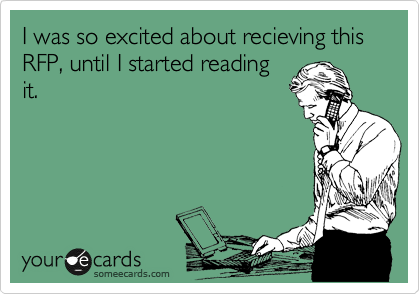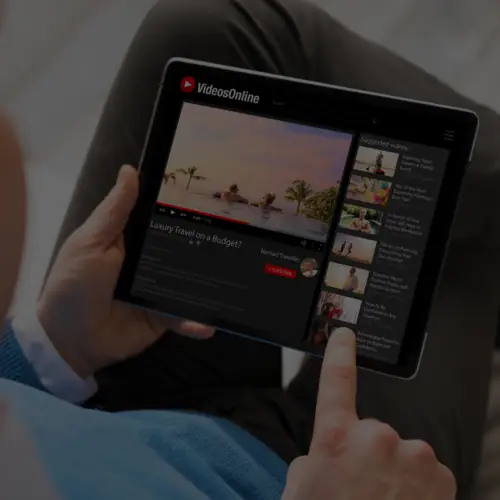14 Oct Why the Best Agencies Don’t Respond to Your RFP
Major companies procurement teams typically require a Request for Proposal be sent before hiring a new marketing agency. At times, these are formalities in which agency marketing teams already know their short list of agencies and are “checking the box” by issuing the RFP. At other times, marketers are genuinely interested in finding someone to help them, in discovering the best partners, in finding out who has a new approach to solve their problems. In these latter times, they want all the invited agencies to not only reply, but to put their best foot forward.

Here’s why we don’t.
What Agencies Want from New Business
When I was on the client side and issued a $13M RFP for advertising services, I assumed I’d be deluged with responses. I got 4-5 good ones, but some of the best names in the game passed on it. I worked for a state government agency at the time, and many agencies probably thought the bureaucracy wouldn’t be worth the hassle. But I was a little disappointed that my work didn’t create more of a stir.
Now that I’ve been in agency management for 15 years, I’ve learned what agencies want from a piece of new business. We want:
- Exciting work;
- Exciting budgets; or
- Exciting relationships.
The best opportunities offer all three, but they are exceedingly rare. And it’s surprising how many times a brand will work hard in the RFP to promise none of the above.
Exciting Work
We had an opportunity in the not-too-distant past to potentially work with an extremely well-known brand introducing a new product line. We got on the phone with the client and he indicated that his goal was to leverage his reasonable (but not huge) budget in a way that helped redefine how marketing product launches use social media. He wanted to gain so much attention from the public that marketers would use it as a case study.
This, of course, aligns with our BHAG of redefining marketing through social media. We were excited and we spent hours working on a strategic, high value, highly visible approach to this.
At the end of the day it didn’t happen for a variety of reasons, but we jumped when this prospect said jump because we were offered a credible chance to do exciting work.
Exciting Budgets
Agencies are businesses, of course, and we’re eager to grow like most new businesses. So evaluating budgets is part of our process of considering if we’ll respond to a Request for Proposal. Budgets matter, as we wrote here.

Too often, RFPs won’t disclose budgets or budget ranges. The thinking, I assume, is that disclosing budgets will take away the opportunity for cost savings. Budgets generally don’t change our rates. They change the volume of services we can provide within those rates. Not disclosing a budget range makes it almost impossible to effectively respond to your request.
Budgets generally don’t change our rates. They change the volume of services we can provide within those rates.
If you tell us, “Tell me what budget I need and I’ll go get it,” we’re sure you mean well. We’re also fairly sure you won’t be able to get the money we suggest. Virtually no organization has a limitless supply of funds just waiting for the right idea.
Exciting Relationships
Having an exciting brand to work on is great. Agencies are proud of their logo pages. But we also typically invest a lot of time upfront to understand your brand and target audiences. It’s the secret for success. So many ongoing client relationships aren’t profitable at the beginning. We over-service to set ourselves up for the long haul.
Many RFPs want to try a project and not a long-term relationship. That’s not necessarily a deal breaker, and it’s become much more common, but the possibility of an ongoing relationship is much more interesting to agencies generally speaking.
In Summary
A couple years ago, we had to fire a client because they didn’t offer us the ability to do good work or make a reasonable amount. And while they were personally nice people, their organization wasn’t in a position to trust the knowledge and expertise we brought to the table. It would have saved both sides a lot of time and money if we’d realized that during the proposal stage and been clear with each other on the fit.
In addition, good agencies stay fairly busy so we can choose which opportunities to pursue and how diligently we pursue them. Yes, all agencies lose clients periodically. And most agencies are looking to grow. But the good ones want to grow the right way, with clients for which there’s a good personality fit, a good collaboration and a healthy level of respect. But during the proposal process, we typically don’t know each other yet, so we have to fall back on other vetting tools: exciting work, exciting budget, exciting relationship.
As you develop your Request for Proposals, consider both your goals and your potential agency partner’s goals to get the best fit.






